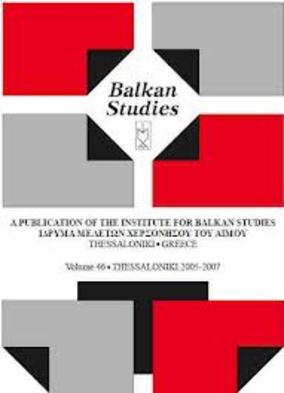The Suez crisis, Cyprus and Greek foreign policy,1956 : A view from the British archives
Part of : Balkan studies : biannual publication of the Institute for Balkan Studies ; Vol.30, No.1, 1989, pages 107-129
Issue:
Pages:
107-129
Section Title:
Articles
Author:
Abstract:
The Suez crisis of 1956 coincided with one of the most difficult periodsof the Cyprus issue, the period which followed Archbishop Makarios’s deportationby the British, in March 1956. The rapid deterioration of Greco-British relations, after March, the need for Greece to fortify her security andto secure more allies for the next session of the General Assembly of theUnited Nations and her need to expand her trade, led the newly elected Karamanlisgovernment to reform the Greek foreign policy. Athens expanded itspolitical and economic relations with Eastern Europe and made openings tothe Arabs. Indeed, Egypt, where Colonel Nasser had established his rule, notonly appeared as the leading Arab nation, but was the host of a large Greekcommunity, which Athens wanted to protect, as far as possible.As the Suez crisis developed, in Summer 1956, Greece found herselfobliged to make nothing less than a choice: Either to side with Nasser andthus protect the Greeks of Egypt and secure Arab support for Cyprus at theUnited Nations, a course which might alienate Britain, or to side with theWestern powers and alienate Nasser, with damaging consequences to theGreeks of Egypt and to the Arab attitude on Cyprus at the United Nations.1 he crux of the matter was whether Greece would participate in the firstLondon Conference on Suez, in August 1956. Greece decided that the prospectof losing Arab support at the United Nations and of endangering the Greeksof Alexandria was too great. She declined the invitation, despite strong Americanpressure to accept it. At the same time, Greece communicated to Londonproposals leading to the exercise of the right of self-determination of Cyprus,while her gesture of organising a truce of guerilla activities in Cyprus, metwith no response from the British. The British led themselves to believe thatthe EOKA had been defeated. As the crisis in Suez moved to military confrontation,London’s willingness to follow American advice decreased. Thus, anAmerican effort to mediate in the Cyprus issue, in October, was ignored bythe British. The year ended with the British declaration in favour of separateself-determination of Greek and Turkish Cypriots, a declaration which openedthe way for the Turkish claim for partition of Cyprus.The decision regarding the Suez crisis was not an easy one for Greece.She had to balance the interests of Hellenism in Cyprus and in Egypt (not tomention the fate of the Greek community in Turkey, which had already suffered in September 1955). In the end, it was a decision on which course presentedthe less dangers, rather than the more benefits.
Subject:
Subject (LC):
Keywords:
The Suez crisis of 1956, Cyprus




